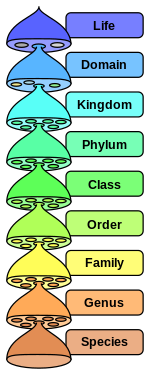 This is just to clarify and justify the Animalia focus. Its just a scientific definition, I advise you not to read it! :)
This is just to clarify and justify the Animalia focus. Its just a scientific definition, I advise you not to read it! :)
and yes, you could fit all creatures, monsters, aliens etc somewhere in this...
Kingdom Animalia
Taxonomic kingdom comprising all living or extinct animals.Animal
Definitionnoun, plural: animals
A living organism belonging to Kingdom Animalia that possess several characteristics that set them apart from other living things, such as:
(1) being eukaryotic (i.e. the cell contains a membrane-bound nucleus) and usually multicellular (unlike bacteria and most protists, an animal is composed of several cells performing specific functions) (
2) being heterotrophic (unlike plants and algae that are autotrophic, an animal depends on another organism for sustenance) and generally digesting food in an internal chamber (such as a digestive tract)
(3) lacking cell wall (unlike plants, algae and some fungi that possess cell walls)
(4) being generally motile, that is being able to move voluntarily
(5) embryos passing through a blastula stage
(6) possessing specialized sensory organs for recognizing and responding to stimuli in the environment
adjective
Of or relating to animals, e.g. animal functions.
Supplement
The following are the grand divisions, or subkingdoms, and the principal classes under them, generally recognized at the present time: Vertebrata, including Mammalia or mammals, Aves or birds, Reptilia, Amphibia, Pisces or fishes, Marsipobranchiata (Craniota); and Leptocardia (Acrania). Tunicata, including the Thaliacea, and Ascidioidea or ascidians. Articulata or Annulosa, including Insecta, Myriapoda, Malacapoda, Arachnida, Pycnogonida, Merostomata, Crustacea (Arthropoda); and Annelida, Gehyrea (Anarthropoda). Helminthes or vermes, including Rotifera, Chaetognatha, Nematoidea, Acanthocephala, Nemertina, Turbellaria, Trematoda, Cestoidea, Mesozea. Molluscoidea, including Brachiopoda and Bryozoa. Mollusca, including Cephalopoda, Gastropoda, Pteropoda, Scaphopoda, Lamellibranchiata or Acephala. Echinodermata, including Holothurioidea, Echinoidea, Asterioidea, Ophiuroidea, and Crinoidea. Coelenterata, including Anthozoa or polyps, Ctenophora, and Hydrozoa or Acalephs. Spongiozoa or Porifera, including the sponges. Protozoa, including Infusoria and Rhizopoda. For definitions, see these names in the vocabulary.
Word origin: Middle English, from Latin, from animāle, neuter of animālis, living, from anima, soul.
Related forms: Animalia (noun), animalian (adjective).